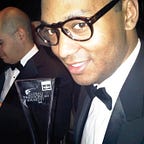Op-Ed | The Disingenuous Display of Diversity
Casting or hiring Black people as a kind of optical illusion is not real inclusion, writes Kevin Fegans.
Flipping through several recent issues of fashion magazines, something felt a little strange to me as a Black man who has worked in public relations his entire career. Noticeably more magazines and advertising campaigns now feature Black women than they did a year ago. But most of these efforts strike me as inauthentic, a kind of overcorrection with Black people on display for whom exactly? Who actually benefits from these displays of inclusivity?
Disingenuous displays of inclusivity are by no means limited to media, of course. These days they also permeate the hiring process at many large companies. A close friend who has worked for several Fortune 500 companies and is a white male said that at the end of an extensive interview process for a chief marketing officer job, a human resources executive told him “off the record” that the company had to hire a Black woman because it was optically advantageous for the company. I personally have noticed an uptick in interest from recruiters saying, “You would be great for the company and are exactly what they are looking for.”
Casting or hiring Black people as a kind of optical illusion is not genuine inclusion. It does little to actually help Black people to advance in the fashion industry or elsewhere. America’s race problem is a wound that we keep trying to bandage without addressing the underlying issues.
For one, the disadvantages of being Black in this country are inextricably linked to wealth and class. “Where do you summer?” It’s a question I will never forget being asked during one of my first job interviews in New York City. I had no clue what that meant or how to answer it. My first job offer was for a role as editorial assistant, which paid $19,000 a year. This was the first time I understood that my starting block was miles behind that of my white wealthy colleagues whose parents paid their rent and provided them with credit cards. To dress the part at a prestigious fashion company was simply impossible for me, even though my parents were incredibly supportive of my ambition and oftentimes gave beyond their means.
America needs to have an honest conversation with itself.
America for its greatness, and appeal as the land of opportunity, has its flaws.
If you have ever met a racist person, there are common psychological threads that each of them possess. An insecurity and disappointment in their lives as it relates to what they imagined success to look like, a limited cultural point of view, sometimes by no fault of their own, and a mental weakness which manifests itself as an insecurity. Racism and bias are not behaviors exclusive to white Americans. The reality is racism and bias exists within all races and cultures. I often have to correct my family for their racists statements, which unlike white supremacy has no malice intent.
I applaud the deliberate efforts the fashion industry has taken to appear inclusive, but also challenge our society to think about cultures and race as a recipe that over time, can be improved and perfected. [MOU1]
Kevin Fegans is the founder of The Communications Bureau, a global communications, marketing and brand strategy agency based in Los Angeles
